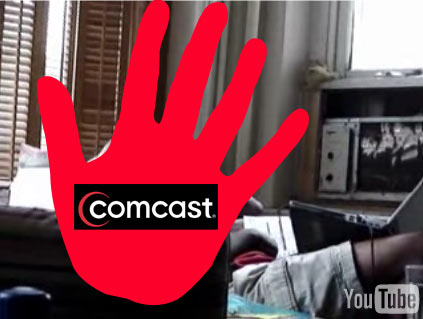In it’s first week Radiohead’s new album In Rainbows was downloaded 1.2 million times and even though they  allowed the “buyer” to choose what they want to pay — including nothing — it has apparently fetched an average of $8 per download. That means that they’ve brought in something like $10-million, which is more than the first-week sales of their previous 3 albums combined. Add to that the fact that there is no middle-man (label, distributor) involved, and that they spent little or nothing on promotions, and you’ve got a very wealthy band. Can anyone who still claims that downloading is bad for artists please take note here?
allowed the “buyer” to choose what they want to pay — including nothing — it has apparently fetched an average of $8 per download. That means that they’ve brought in something like $10-million, which is more than the first-week sales of their previous 3 albums combined. Add to that the fact that there is no middle-man (label, distributor) involved, and that they spent little or nothing on promotions, and you’ve got a very wealthy band. Can anyone who still claims that downloading is bad for artists please take note here?
But here’s what’s really amazing: Only the top 2 best-selling albums on the Billboard chart this past week sold over 100-thousand copies, and there’s speculation that this coming week none will even be close to triple-digit sales. Radiohead’s album just completely blows theses sales numbers out of the water.
Meanwhile the RIAA continued to spend energy attacking universities and their  students with a fresh round of pre-litigation letters this past week. If only they spent those resources doing research to keep up with current trends and developing their own new distribution models. Apparently the RIAA doesn’t find it embarrassing to keep spending lots of money suing college kids who enjoy music, while the world is passing them by and the bands that they supposedly represent detach themselves and come up with their own brilliant business models for selling downloads.
students with a fresh round of pre-litigation letters this past week. If only they spent those resources doing research to keep up with current trends and developing their own new distribution models. Apparently the RIAA doesn’t find it embarrassing to keep spending lots of money suing college kids who enjoy music, while the world is passing them by and the bands that they supposedly represent detach themselves and come up with their own brilliant business models for selling downloads.
But wait, there’s more! Now internet service providers are getting into the act. It’s been reported that Comcast is  interfering with users who attempt to share media files over broadband connections. This is presumably to try and stop file-sharing networks like torrents — even though there are many legit/legal uses for such technologies. Again, it’s a waste of energy. File sharing will continue to grow as new technologies emerge, and users will switch to service providers who let them use the internets in whichever way they like. Businesses should spend their resources getting ahead of the curve; figuring out how to take advantage of these technologies to sell media.
interfering with users who attempt to share media files over broadband connections. This is presumably to try and stop file-sharing networks like torrents — even though there are many legit/legal uses for such technologies. Again, it’s a waste of energy. File sharing will continue to grow as new technologies emerge, and users will switch to service providers who let them use the internets in whichever way they like. Businesses should spend their resources getting ahead of the curve; figuring out how to take advantage of these technologies to sell media.
There’s a discussion of alternate music-biz models in the book The Future of Music, and one of the best  ideas is to create a small fee for media downloads, added to a user’s monthly bill for internet service. A huge pool of money would be built up with less than a dollar a month on the bill of each user. It’s not hard to figure out what’s being downloaded, and how much, using technologies that already exist and that data can be used to determine what artists should be paid for their works. Canada looks set to implement something similar soon, though it will only be on legal downloads. The better plan would be to allow people to continue downloading for free. At least it would feel that way because the fee on their monthly bill would be virtually unnoticeable.
ideas is to create a small fee for media downloads, added to a user’s monthly bill for internet service. A huge pool of money would be built up with less than a dollar a month on the bill of each user. It’s not hard to figure out what’s being downloaded, and how much, using technologies that already exist and that data can be used to determine what artists should be paid for their works. Canada looks set to implement something similar soon, though it will only be on legal downloads. The better plan would be to allow people to continue downloading for free. At least it would feel that way because the fee on their monthly bill would be virtually unnoticeable.
Related: Defending The Pig – Oink Croak/rupture writes an enlightened article about file-sharing website Oink which was just shut down by authorities.
Update: Sure enough; no CD sold more than 77-thousand copies this past week.
Update: UK Charts Company to recognise album sales on USB Flash disks

The radiohead model seems pretty easy to duplicate, especially (as /rupture suggests) in conjunction with some kind of paypal site. I’m curious; do you see a dissemination of this method in the future? Hope so.
What the Radiohead model suggests is the breakdown of the traditional distribution chain. Artists can now sell music straight to fans over the internet. I think we’ll continue to see more and more of this. Too bad for the old music industry that they didn’t catch on sooner. Their loss, better for us.